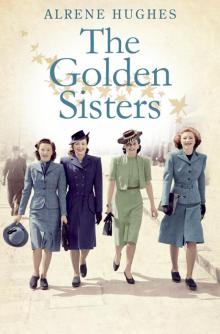- Home
- Alrene Hughes
Martha's Girls Page 2
Martha's Girls Read online
Page 2
Sheila, her eyes wet with tears, stood up as they came in. The doctor immediately crossed the room and raised Robert’s bowed head. Martha looked into her husband’s staring eyes and felt her knees give way.
*
She could still feel the smart of smelling salts in her nose an hour later when they came to remove Robert’s body. It was a sudden death, the cause of which couldn’t be determined by Dr. Patterson, and there would have to be a post-mortem and an inquest. The ambulance in the street had attracted the neighbours and little Bernard Murray was there hopping up and down on one leg chanting at the top of his voice: ‘Touch my collar, touch my toes. Hope I never go in one of those!’
Martha knew they were wondering who was sick at the Gouldings’ house. My God, she thought, they’re going to get a shock when Robert is carried out wrapped in a sheet. The indignity of it made her shudder and she said another prayer for the girls on their way home from work. ‘Please don’t let them get here until Robert has gone.’ But a part of her wanted them there to give her strength. She chided herself for being selfish; better they were spared these images that would surely stay with Sheila and her for ever. She turned as she heard the ambulance men coming through from the kitchen and at that moment Sheila shouted from upstairs.
‘Mammy, Mammy! It’s Irene, Pat and Peggy. They’re home!’
‘All right missus, we’ll be on our way now.’ They carried the stretcher between them as though they were shifting a settee, manoeuvring it out the front door.
Martha stood on tiptoe and watched her daughters come into view, Peggy chatting, Irene laughing, Pat looking ahead, frowning then breaking into a run. Her sisters stared after her, then they too ran.
‘Wait!’ Martha shouted as the stretcher disappeared through the door. She imagined the scene seconds before it happened. On the path Pat and the man at the front of the stretcher stood face to face, neither moving.
‘What’s going on? Who’s sick?’ Pat fired out the words, the panic rising in her voice.
‘Mammy where are you?’ Peggy ran round her sister, trampling the marigolds in the neat border and stopped short for a split second at the sight of the sheet. Then she reached out, her fingers like claws.
Martha grabbed them just in time. ‘It’s Daddy,’ she said in a low voice. ‘Daddy. He’s gone.’
And at the gate Irene began to scream.
The Goulding family stood centre stage like characters in a music hall melodrama, their home a backdrop lit by the fading evening sun and by now half the street in the audience. It was Pat who moved first. Gently, she put her arms around Irene and shushed her screams into low sobs. Then, as she led her across the garden to the house, she nodded to the man she had confronted only moments before and he, anxious to retreat from all this public grief, quickly carried Robert Goulding away from his home and family.
*
Pat’s eyes moved slowly around the table. There was nothing else to be told or known. Dr. Patterson would return the following afternoon with the results of the post-mortem and he would also inform the undertaker. Sheila, still in her school uniform, had laid her head on her arms. Pat couldn’t tell if she was still crying, but every now and again she would breathe in noisily. Irene stared straight ahead; she hadn’t spoken since Pat brought her indoors and it was hard to tell if she had absorbed the meagre information Martha and Sheila had been able to pass on.
Martha was agitated, couldn’t keep still. She made them all a cup of tea then put a plate of biscuits and some handkerchiefs on the table. Peggy was tugging at one now, a furious expression on her face.
‘I don’t understand it. He wasn’t old. He wasn’t sick. And where have they taken him? Why couldn’t one of us go too?’
Pat tried to explain. ‘We can’t go with him, he’s—’
But Peggy wasn’t listening, her thoughts raced ahead. ‘We’ve forgotten the concert!’ We’re meant to be singing at church tonight!’
They looked at her in astonishment. Pat was the first to speak. ‘Peggy, Daddy’s just died. We can’t sing at a concert.’
‘But we have to. We promised and we’ve been rehearsing for ages.’ She stood up. ‘I’m going to get ready. We’ll miss the beginning, but we’re not on ‘til after the interval.’
Martha spoke sharply, ‘Peggy Goulding, you can put that notion right out of your head. What would people say, your father not dead five minutes and his girls out singing?’
‘You might as well sit down,’ said Pat, ‘because Irene and I aren’t going anywhere and you can’t sing on your own.’
‘But haven’t you forgotten something? It’s to raise money for the shipyard widows.’ Then, unbelievably, Peggy laughed, ‘and that’s just what you are now, Mammy, a shipyard widow!’
What little composure and dignity Martha had been clinging to since Robert died, dissolved in an instant. She covered her face and wept.
Pat blazed with anger. ‘I can’t believe what you’ve just said! What are you doing to Mammy, to all of us? This isn’t the time for your selfish nonsense. For goodness sake, Daddy’s dead. Don’t you care?’
‘He was my father too.’ Peggy’s voice was devoid of emotion. ‘You might think, Miss Wonderful Voice, that you meant more to him than the rest of us, but it just isn’t true. If he was here now you know what he’d say …’ and she put on a passable impersonation of their father’s voice. ‘Now, Pat, let’s not have the amateur dramatics.’ Then in her own voice she shouted, ‘And you know, I’m right!’
Pat was near the limits of her self-control and whether her sense of propriety, or the urge to reach across the table and grab Peggy by the hair, would have prevailed she never discovered, because at that moment, Irene spoke at last. ‘Daddy hated arguments. Do you remember he’d say, “If you can’t say anything civil, say nothing at all.”? He taught us respect and manners. “We mightn’t have money, but we have self-respect,” he said.’
They sat in silence a while, no sobs now, nor anger either. The light was fading fast in the kitchen, but no one felt inclined to turn on the light. The clock high on the mantelpiece ticked on and Pat thought of the people at church singing hymns and, although she’d never admit it, she wished that she could sing right now, for it was the only thing she knew that could ease the pain she felt. The room was almost totally dark when Peggy broke the silence.
‘Well, that’s it. I’ve decided. I won’t be singing again. As from now, the trio of Goulding sisters is a duo!’ With that she left the room, switching on the light with a flourish.
Chapter 2
The grey clouds hung low over Belfast City Cemetery. The sliver of the Lough and the shipyard cranes like Meccano toys were barely visible and the Cave Hill was topped by low cloud. The old Belfast saying: ‘If you can’t see the Cave Hill it’s raining and if you can it’s going to rain,’ was true enough today. The fine drizzle, which had begun in the early hours of the morning, seeped steadily through the coats of the mourners as Robert Goulding was lowered into his grave.
Martha and Robert had few relatives, but family friends and Robert’s workmates from the shipyard swelled the numbers. They were strong men used to hard and sometimes dangerous physical labour, men who clamped their emotions inside like a vice and no doubt a few of them were strengthened this morning by a stiff drink to keep out more than the rain. They were in their working clothes, some with tin piece boxes under their arms, many carrying tool bags. When they had seen their friend laid to rest, they would finish their shift having lost a couple of hours’ wages and not one of them would begrudge it.
Pat was aware that Jimmy McComb, her father’s apprentice, was watching her closely, but she refused to meet his eye after his behaviour the previous evening. She’d been alone in the house; everyone had gone to the funeral parlour except her. She’d pleaded a headache, but the truth was she couldn’t bear to see her father lying in a coffin. Shortly after they left, Jimmy came to the front door, which suggested some formality in his purpose. Every other time h
e’d been to the house, he’d come round the back.
‘I’ve come to bring you your father’s tool bag. They had it in the office at the yard.’ He held out the brown canvas bag with the outline of tools bulging its sides and the handle of a saw poking out of the top. Pat didn’t take it. Instead she looked from the bag to his face and back.
‘You’d better come in then. Mammy and the others have gone to the funeral parlour,’ she explained. Then noticing how uncomfortable he was, she added. ‘You can sit down for a while if you like.’
The windows were open and the sound of the children playing in the street floated in on the soft breeze that ruffled the curtains.
‘I’m very sorry about Mr. Goulding. The lads at the yard were shocked, so we had a wee bit of a collection.’ He handed her a grease stained paper bag. ‘I know Mrs Goulding will get a pension, but we just wanted to show youse we were sorry.’
‘Thank you, Jimmy. Please tell everyone we appreciate their kindness.’ His face fell and Pat wondered if he expected a less formal response.
‘Would you like a cup of tea?’ she offered.
‘Ah … no.’ He shifted awkwardly, but showed no intention of leaving. They sat in silence as the sound of a skipping rhyme filtered through the open window:
‘Apple jelly, blackcurrant jam
Tell me the name of your young man.’
Pat smoothed her skirt over her knees. Jimmy stared at the hem where it met her firm legs and in a rush began to speak. ‘The foreman offered me a permanent job at the yard when I finish my apprenticeship next month. I’ll get a rise in pay.’
‘That’s great, Jimmy.’
He didn’t detect her lack of interest. ‘Aye, I’ll have the money to be going out and enjoying meself. Mind you, I was thinking a wee bit a company would be good too, if you get me drift an’ all.’
‘Jimmy, how could you? Daddy’s being buried tomorrow and you’re round here trying to ask me out!’ She stood up, hoping he’d realise she wanted him to go.
Instead, he stood to face her. ‘But I’ve always liked you, Pat, ever since I first came round here with Mr Goulding. I think about that summer all the time, when I helped him fix the fence out the back garden and you talked to me about the roses. Do you remember?’ He put his hand out to touch her face.
She moved her head back. ‘No I don’t. Why would I?’
‘Look I’m only asking you to go out with me for a bit of company. I’ve told you, I’ll have money to spend.’
How she wished she hadn’t let him in. If only she’d taken the tool bag off him at the door. ‘Jimmy McComb, are you suggesting I would go out with someone just because they had money to spend? Now you get this straight. I go out with someone because I like them and right now you don’t come anywhere near that category.’
It was as though he’d been slapped in the face. He stepped back, all bravado gone. ‘I just thought that—’
‘I know exactly what you thought,’ she snapped, ‘but what you didn’t think is that you’ve only got that job because my father is dead. You’re so stupid, you didn’t realise that it’s Daddy’s job you’ve taken and he’s not even buried yet!’ With that she pushed past him and ran into the kitchen. He could see himself out.
*
The curtains in the street were still drawn as a mark of respect, when the funeral car deposited Martha and her daughters outside their home. The rest of the mourners arrived shortly after for a bite to eat and a cup of tea.
Martha and Irene had been up at six to start the baking: Victoria sponges, fairy cakes, seed cake and three different kinds of scones. Pat and Peggy had made the sandwiches and Sheila was given the job of washing all the china. Before they left for the funeral they had laid everything out, covered with tea towels to keep it fresh. As the first kettle came to the boil, Anna, Martha’s younger sister, and her husband Thomas Wilson arrived in their new Rover motor car, gleaming red with plenty of chrome.
‘Don’t mind us,’ said Anna adjusting the fox fur around her shoulders. ‘We’ll just sit in here and let you get on with things.’ She looked carefully at the armchair under the window, weighing up its worn beige brocade before, in one continuous movement, she smoothed the back of her skirt with both hands and sat down. Thomas didn’t sit, but stood with his back to the unlit fire as though warming himself. His pinstripe suit was well cut, his shirt gleaming white and a gold watch and chain stretched across his waistcoat. The other mourners began to arrive and the front room steadily filled up.
‘Bad business about Poland,’ Thomas said to no one in particular.
‘It was bound to happen,’ said Kathleen, Robert’s sister. ‘I’m telling you, Hitler won’t stop ‘til he’s got everything he wants. You can’t reason with a man like that. You have to stand up to him. That’s what Chamberlain’s got to do now.’
‘If he does, it’ll be war for sure,’ said Thomas, ‘and we’ll be hit hard in Belfast, I can tell you, living within spitting distance of one of the biggest dockyards in the country and as if that isn’t bad enough, it’s cheek by jowl with a huge aircraft factory. Oh aye, you mark my words, we’ll get it in the neck all right.’
In the kitchen Anna, who’d slipped away at the first sign of war talk, was also getting into her stride. The fox fur had slipped a little, but she still wore her hat clamped firmly in place with a huge amber hatpin as sharp as the words she was directing at her sister.
‘You’ve got to face up to it Martha, now that Robert’s gone you just can’t afford it. This is a decent-sized family house in a good area. You’ve a garden front and back and an indoor toilet with a bath for goodness sake. I’ve no idea how much rent you’re paying for this, but I’m certain you won’t be able to afford it on a widow’s pension.’
Martha struggled to defend herself. ‘There’s the girls’ wages.’
‘Sure that’ll barely feed the five of you, let alone heat the house and put clothes on your backs.’
‘I could get a job.’
‘Get a grip, Martha! What could you do? Think about it, who’d take on a woman of your age with no skills to speak of?’
‘In the name of all that’s holy, Anna, my husband’s dead. Will you not leave me be?’
‘Oh I’ll leave you be all right. You made your own bed when you married that man and if you’ve been left penniless and maybe even homeless, you’ve only yourself to blame.’
‘How dare you speak to me like that, today of all days! I’ve put up with your slights all my life, but you’ve no business speaking about Robert like that.’
‘It’ll be my business, when you’re on your way to the poor house and expect Thomas and me to bail you all out!’
It took less than half a second for Martha to grab the sneering fox and rip it from Anna’s shoulders. Then Peggy was there, pulling her mother away and glaring at her aunt.
‘I don’t know what you’ve said, but it was a mistake. This is the worst day of our lives and you’ve probably made it worse! We don’t want you here, so why don’t you collect that pompous husband of yours, get in your big car and go home?’
Anna pulled down on the hem of her costume jacket and touched her hat. It hadn’t moved. She didn’t speak. Her brown handbag lay on the table, brown gloves on top. She picked them up, hung the bag on the crook of her elbow and began to pull on a glove. Very slowly and deliberately she dealt with each finger pushing it into the tip. This would be no rushed exit, despite the anger blazing in Peggy’s eyes and Martha’s sobs.
‘There’s no need for hysterics, Martha,’ said Anna. She refused to acknowledge Peggy. ‘I was simply advising you to find yourself somewhere smaller and cheaper.’ She smoothed out the wrinkles on the back of each glove. ‘I’m going now,’ she said, ‘because I don’t like to leave Alice and Evelyn for too long. I’ll drop you a letter in the week.’
Martha said nothing as her sister swept past her. A moment later she heard Anna in the front room interrupting Thomas mid flow and sharply telling him it was time t
o get back to their daughters.
‘She’s got a nerve speaking to you like that!’ Peggy was furious, but tried to keep her voice low. ‘She’s always bossing people around. Just because she’s got a bit of money she thinks she can tell people how to live their lives. You shouldn’t let her speak to you like that, Mammy. You should have told her to go and not come back, never mind writing to you in the week. What’s she going to write anyway, only more things to upset you? I’m telling you, if I see that letter I’ll put it straight in the bin, so I will.’

 The Girl from the Corner Shop
The Girl from the Corner Shop Martha's Girls
Martha's Girls A Song in my Heart
A Song in my Heart Golden Sisters
Golden Sisters